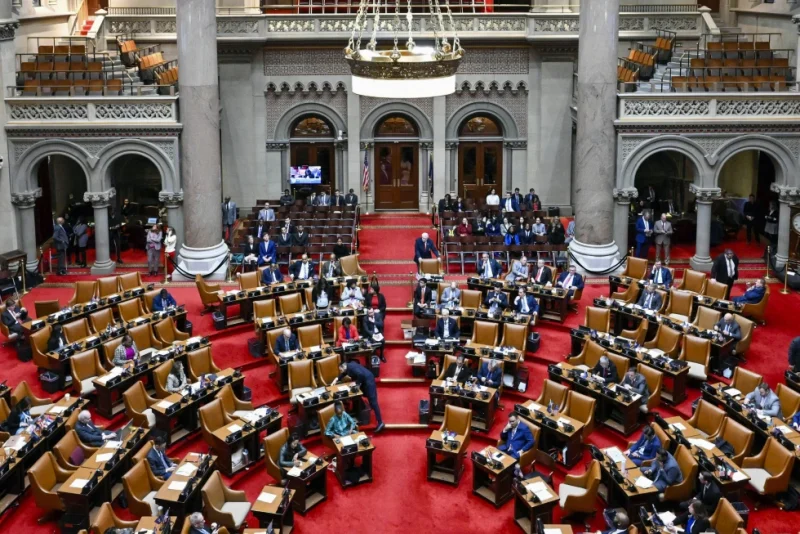
OAN’s Elizabeth Volberding
10:32 AM – Sunday, April 21, 2024
SEE: https://www.oann.com/newsroom/n-y-legislators-approve-237b-budget-addressing-surge-of-migrants-plans-to-jump-start-housing-market/; republished below in full, unedited, for informational, educational, & research purposes:
A $237 billion state budget that includes measures to encourage home construction and combat unauthorized marijuana stores was approved by New York lawmakers over the weekend.
The package addresses a recent surge of immigrants, expedites the closing of some state prisons, and maintains the policy of allowing people to purchase takeout drinks during the pandemic.
The state Senate and Assembly approved a number of budget bills on Saturday. The budget now goes to Governor Kathy Hochul (D-N.Y.), who is anticipated to sign it into law.
Additionally, $2.4 billion has been set aside by state authorities to assist with the large number of immigrants in New York City’s homeless shelters. The funds will be used for the immigrant population’s housing, legal needs, and medical treatment.
Lawmakers also took action in response to the growing number of unauthorized cannabis shops in New York City. The state has found it difficult to close the stores, which have proliferated throughout the Big Apple, due to bureaucratic obstacles.
The budget also contains provisions that would make it easier for local law enforcement to close down establishments suspected of selling marijuana illegally while their legal cases are pending, which would help address the issue. Previously, the state was solely responsible for the majority of enforcement, and these types of establishments could remain open while a drawn-out appeals process took place.
Hochul and leading legislative leaders engaged in private negotiations that centered mostly around a comprehensive plan to stimulate the state’s housing market.
Developers who agree to rent a share of the units in new buildings below the market rate will receive a tax benefit under the plan. Though not as extensive as many advocates had hoped, the agreement also contains protections against evictions and unjustified rent increases for some residents.
Governor Hochul made a statement after the budget’s passage, saying:
“In my State of the state, I promised New Yorkers we’d fight to build more housing, improve education and protect public safety — and that’s exactly what our budget is going to do.
“This budget agreement represents the most significant improvement in housing policy in three generations. This includes transformative investments in health care and education that will put our state on the path to fiscal stability. It will end co-pays for insulin, establish first-in-the-nation paid prenatal leave, and launch the EmpireAI consortium. This budget cracks down on retail theft and gives us new tools to shut down illicit cannabis storefronts. It helps the children of New York City by extending mayoral accountability for public schools. We got it all done without raising income taxes by a single cent.
“I’m grateful to Speaker Heastie, Leader Stewart-Cousins and my colleagues in the Legislature for their collaboration on this agreement, and look forward to continuing to work together.”
During floor debates, state Senate Republican Leader Rob Ortt (R-N.Y.) attacked the proposal, claiming it would attract more illegal migrants to New York.
“We made a lot of tough decisions in this budget,” Ortt said. “But 2.4 billion goes a long way, and I just wonder what that could have done in other parts of the budget for legal New Yorkers.”
Additionally, in an effort to conserve money in light of the state’s decreasing prison population, New York will expedite the closure of up to five state prisons. The governor will decide which jails to close by March of next year. The state’s corrections administration reports that since 2011, the state has closed two dozen prisons due to vacant beds, saving approximately $442 million a year.
The budget also included provisions to allow movie theaters to sell hard liquor, extend the pandemic-era sale of to-go alcoholic drinks, and allow New York City to lower its speed limits. These measures would also provide paid time off during pregnancy.
The state office responsible for drafting laws for the Legislature was affected by a cyberattack, which delayed the budget’s finalization by almost three weeks from its planned deadline of April 1st.
Stay informed! Receive breaking news blasts directly to your inbox for free. Subscribe here. https://www.oann.com/alerts
